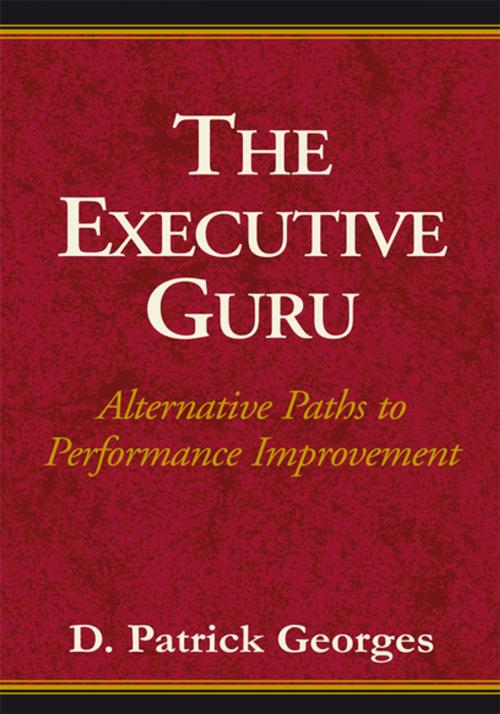The Executive Guru
Alternative Paths to Performance Improvement
Business & Finance, Management & Leadership, Management| Author: | D. Patrick Georges | ISBN: | 9781462802739 |
| Publisher: | Xlibris US | Publication: | January 12, 2000 |
| Imprint: | Xlibris US | Language: | English |
| Author: | D. Patrick Georges |
| ISBN: | 9781462802739 |
| Publisher: | Xlibris US |
| Publication: | January 12, 2000 |
| Imprint: | Xlibris US |
| Language: | English |
We are all familiar with the glass ceiling blocking womens access to top corporate positions. But there is another largely unknown glass ceiling that blocks both womens and mens efforts to achieve optimum results. It is made up of invisible factors such as expectations, beliefs and the energy needed to carry out ones plans and decisions. By now, even kids know the habits of highly effective people, but what about their secret habits?
This book is the result of research conducted following the frustration caused by the authors inability to answer certain irritating questions faced during his 30-year career as manager and consultant.
Why, despite conscientious efforts, sometimes effective managers fail to achievecertain attainable goals?
Why do intelligent and educated people sometimes say or do dumb things?
What is the use of sending people to training courses, if they do not expect to derive any benefits or do not believe they are capable of improving performance?
What is the importance and interrelationship of self-image and self-esteem in personal development?
Are there ways of improving managerial performance other than by using conventional management skills?
Could improved performance perhaps be attained by tapping into the vast resources of the unconscious mind?
Such questions, coupled with the painful shock caused by downsizing and outsourcing organizations and a diminishing sense of job security, have also made increasing numbers of people seek answers and comfort within themselves. As well, an increasing number of people expect work to provide them not only with a paycheck, but also with fulfillment. And it is not only individuals who seek to access the vast resources that may exist within each one of us. Major corporations have begun looking for ways to improve the bottom line through spirituality, while the Spirituality in the Workplace theme now appears on business conference agendas.
But do we need gurus at work? Empirical evidence suggests that fulfillment and creativity are related to an energy source commonly referred to as "spirit." Apparently, results of using traditional management tools may be enhanced, if we marshal our latent mental energies and incorporate new approaches to performance management, focusing on factors that may help us smash the unconscious glass ceiling blocking the achievement of optimum results.
Businesses, training organizations, government agencies and the media have been following the movement towards exploration of inner space, a topic that--regardless of preconceived notions and skeptics reservations--merits the attention of business leaders. Spirituality is a sensitive issue, and some workers already resent such corporate programs because they consider them an intrusion into their private spiritual world.
The Executive Guru may serve as a down-to-earth guide for those interested in examining complementary ways of developing their potential or dealing with the rapid changes and stresses of our times. It is written in parable form, hopefully making it an easier read than a straight-forward management book after a hard day at work. The story is that of an effective manager baffled by requests from staff to attend off-site training courses with mystifying names: Huna, Neurolinguistics, Reiki, Timeline Programming. He seeks advice from a guru who surprisingly provides him with businesslike answers backed by scientific evidence. The manager is convinced that there is more out there than meets the eye and decides to add the gurus lessons to his arsenal of management tools.
Reading management books and attending conventional training courses may have helped you to take charge of your work by using more effective managerial skills. This book will provide you with businesslike ideas on complementary approaches to increased creativity, personal development and fulfillment
We are all familiar with the glass ceiling blocking womens access to top corporate positions. But there is another largely unknown glass ceiling that blocks both womens and mens efforts to achieve optimum results. It is made up of invisible factors such as expectations, beliefs and the energy needed to carry out ones plans and decisions. By now, even kids know the habits of highly effective people, but what about their secret habits?
This book is the result of research conducted following the frustration caused by the authors inability to answer certain irritating questions faced during his 30-year career as manager and consultant.
Why, despite conscientious efforts, sometimes effective managers fail to achievecertain attainable goals?
Why do intelligent and educated people sometimes say or do dumb things?
What is the use of sending people to training courses, if they do not expect to derive any benefits or do not believe they are capable of improving performance?
What is the importance and interrelationship of self-image and self-esteem in personal development?
Are there ways of improving managerial performance other than by using conventional management skills?
Could improved performance perhaps be attained by tapping into the vast resources of the unconscious mind?
Such questions, coupled with the painful shock caused by downsizing and outsourcing organizations and a diminishing sense of job security, have also made increasing numbers of people seek answers and comfort within themselves. As well, an increasing number of people expect work to provide them not only with a paycheck, but also with fulfillment. And it is not only individuals who seek to access the vast resources that may exist within each one of us. Major corporations have begun looking for ways to improve the bottom line through spirituality, while the Spirituality in the Workplace theme now appears on business conference agendas.
But do we need gurus at work? Empirical evidence suggests that fulfillment and creativity are related to an energy source commonly referred to as "spirit." Apparently, results of using traditional management tools may be enhanced, if we marshal our latent mental energies and incorporate new approaches to performance management, focusing on factors that may help us smash the unconscious glass ceiling blocking the achievement of optimum results.
Businesses, training organizations, government agencies and the media have been following the movement towards exploration of inner space, a topic that--regardless of preconceived notions and skeptics reservations--merits the attention of business leaders. Spirituality is a sensitive issue, and some workers already resent such corporate programs because they consider them an intrusion into their private spiritual world.
The Executive Guru may serve as a down-to-earth guide for those interested in examining complementary ways of developing their potential or dealing with the rapid changes and stresses of our times. It is written in parable form, hopefully making it an easier read than a straight-forward management book after a hard day at work. The story is that of an effective manager baffled by requests from staff to attend off-site training courses with mystifying names: Huna, Neurolinguistics, Reiki, Timeline Programming. He seeks advice from a guru who surprisingly provides him with businesslike answers backed by scientific evidence. The manager is convinced that there is more out there than meets the eye and decides to add the gurus lessons to his arsenal of management tools.
Reading management books and attending conventional training courses may have helped you to take charge of your work by using more effective managerial skills. This book will provide you with businesslike ideas on complementary approaches to increased creativity, personal development and fulfillment















